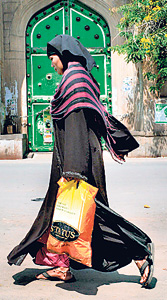There is an erroneous impression after the recent Supreme Court judgment that the Muslims in Andhra Pradesh have been given four per cent reservations in jobs and education. The fact of the matter is that the court has upheld only that part of the Andhra Pradesh act which relates to Muslims belonging to Other Backward Classes (OBC). Rightly, the court has referred to the five-judge constitution bench the portion relating to reservations to the Muslim community on the whole.
This was necessary because the constitution does not provide any reservations on the basis of religion. The only exception is in the case of Scheduled Caste and Scheduled Tribes. Subsequently the OBC were also included in the list of reservations.
The issue came to light a couple of years ago when the Backward Classes Commission of Andhra Pradesh identified 14 more Muslim groups which were socially and educationally backward but had not been included in the original list. Consequently, the state passed a legislation to include the 14 groups in the backward members of the Muslim community. So far, so good one can say.
The state saw the point and went along with the plea that while hairdressers, dhobis and those working in the cremation grounds in the Hindu community were extended reservation benefits under the backward class, similarly placed groups in the Muslim community were deprived of the benefits. The legislation did away with the discrimination to include the 14 groups.
But where the government went wrong was when it said that all Muslims would be entitled to four per cent reservation except the Sayeds, Mughals, Mongols - the Ashrafs of the community - which were considered the highest caste among Muslims like the Brahmins among the Hindus. The government was probably not as much to blame as the commission because the latter said in its recommendation that since only a small minority of Muslims is regarded as Ashrafs, it would be better to include the entire community as qualified to be backward.
The Andhra Pradesh High Court rejected by 5 to 2 the commission's criteria for determining most Muslims as the backward and, therefore, gave a stay order. The court's argument was weighty. It said that no criterion had been laid down to find out how many Muslims were from the upper castes and how many from the OBC. To categorise the entire community as OBC was not fair.
The Andhra Pradesh High Court was, however, keen on including the 14 groups in the OBC category. It did so. But it did not want to dilute the benefits enjoyed by the other backward classes, some 41 per cent in the country, by extending the concessions to the Muslims on the whole. The state had no right to give four per cent reservations to Muslims because it increased the overall quantum of reservations.
 |
| An Andhra Pradesh Muslim woman walks with a bag of groceries. |
The centre has already allotted 27 per cent through the Mandal Commission recommendations. The reservations of SC/ST come to 22.5 per cent. Already this adds up to 49.5 per cent. Any more reservation would violate the Supreme Court's directive which laid down that reservations cannot be more than 50 per cent.
The problem may arise if and when the existing criterion for OBC is stretched to include more and more groups. Were there to be any compromise on the question of criterion, other backward classes would start protesting because the criterion for backward Muslims and backward Hindus has to be the same. Were the government to give in on this point, it would face another Mandal-type agitation which had shaken the northern India in 1990.
The religion-centric reservation poses a grave danger of fissiparous tendencies developing in the country. Reservations for Muslims will be looked at in the same way and may create a backlash which may not be good for the community itself and may endanger the equanimity that the society enjoys at present.
That the Muslims should get reservation in jobs and education on the basis of backwardness is understandable. And some OBC categories from among the Muslims are enjoying the concession. But any such benefits on the basis of religion can be exploited by extremists from among Hindus. Some Muslim leaders are unthinkingly raising the standard of reservations aloft for their community. They are unnecessarily arousing the sentiments of the community. The eyes of the present Muslim leadership are fixed on electoral politics but their approach is highly sectarian.
The Sachar Commission on the plight of Muslims was correct in diagnosing the malady. It pointed out how the community had been denied its share in education, economic benefits and services on the basis of its population. However, the subsequent Ranganathan Commission has recommended reservations for all minorities on the basis of religion. This recommendation is an unfortunate one.
India is a pluralistic society and it cherishes diversities in the name of religion, language and customs. The community consciousness which the reservation activists are trying to arouse may deliver a serious blow to pluralism. The same old question of separate identity will come to the fore while there should be only one identity-Indian. The reservation for Muslims may open the Pandora's Box of communal and divisive politics.
Yet the 12 to 13 per cent of Muslim population in the country should reflect their number in employment in government and the private sector. The community's share should also be tangible in the economic fields. There is no alternative to the affirmative action. The government has done little since the submission of the Sachar Commission report two years ago.
But mixing genuine aspirations of the Muslims with religion may be misdirecting the effort in finding a remedy to the long-time neglect. The louder the reservation activists raise their voice, the more unfavourable would be the fallout for the Hindu extremists to exploit. The pluralistic India cannot afford it. Nor can the Muslims. |



